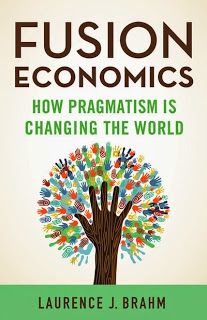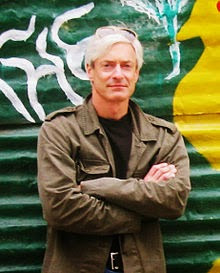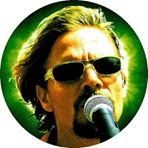SUMMARY: Welcome to a power-packed Radio Ecoshock Show. I’m Alex Smith. My guests are George Kourounis, host of
the TV show “Angry Planet”, and the solar-powered international musician known as Turtuga Blanku. But first, we’ll talk with a
high-powered international lawyer who switched from taking multinational companies into China, to creating new alternatives for
local economies.
Download or listen to this Radio Ecoshock show in CD Quality (56 MB) or Lo-Fi (14 MB)
Or listen on Soundcloud right now!
Some music in this program comes courtesy of a donation-in-kind of a super new (to me at least) computer synthesizer called “Diversion”. It comes from a small programmer and musician: Dmitry Sches. He’s just put out a new VST that looks intriguing, called Tantra. Check it all out here.
LAURENCE BRAHM – TOWARD A NEW ECONOMY FOR A DAMAGED WORLD
Radio Ecoshock has remarkable guests. Our next is no exception. He was a lawyer advising China, to bring big name multinational companies into that Asian economy. Now he’s writing about anti-globalization, localizing economies, and the coming eclipse of the Western banking model. His latest book is “Fusion Economics – How Pragmatism Is Changing the World“.
Who is Laurence J. Brahm? Let’s find out.
In the 1990’s, as an international trade lawyer, Laurence Brahm was instrumental in bringing big-name multinational into China. In 1996, he wrote a book called “China’s Number One” predicting China would become the world’s largest economy. That drew heat and criticism, but now, according to the World Bank, China is the world’s largest economy.
More and more, Brahm turned to advising the government of China, which he still does. He wrote a biography of Zhu Rongji, the former Premier of China, and often seen as an architect of the modern Chinese economy.
Laurence Brahm
In 2002 Laurence retired from his practice as an investment lawyer, to seek “Shangri-La”. In 2005, he moved to Tibet, and started a business restoring buildings. He helped found the Himalayan Consensus (more about that in the interview). One of his role models is the Bengladeshi Muhammed Yunis, founder of micro-credit banking.
Also in 2011, he helped form the African Consensus. One innovations of this Consensus was to say the true cause of violence and terrorism is economic poverty and identity stripping.
In 2011 Laurence attended the Climate Conference in Durban South Africa. He found it useless, and joined the protesters outside. He says China is more aware of the dangers of climate change, especially since the disappearing Himalayan Glaciers will dry out the Yellow River. Brahm is quite aware of the challenges climate change is posing for many countries and peoples.
In 2014 he attended the Nepal Economic Forum (see You tube presentations here), and in 2013 the G20 Counter Summit in St. Petersburg (You tube here).
On the economy, Laurence sees the end of world domination by the Bretton Woods World Bank IMF model. In the near-term he sees two parallel universes: the Western reserve currency system, and the BRICS (Brazil, Russia, India, China, South Africa) system, based mainly on the Chinese currency Yuan (pronounced Yen) and in Beijing.
He sees the latest sanctions on Russia driving that country closer to China. The two can be natural trading partners, because China needs to import clean food (much of China is not able to produce food, and Chinese food may be contaminated); and water (Beijing itself is facing desertification, China needs a lot of water). To make this trade happen, there needs to be more infrastructure, such as pipelines and roads, connecting the two countries.
His latest book is “Fusion Economics – How Pragmatism Is Changing the World”. Brahm is a curious mix of a lawyer at home with CEO’s and bankers, who also protests as an activist.
Laurence has his own You tube channel.
He talks about “compassionate capital” and “conscientious consumption”. Brahm recommends we set up our own alternative financial systems (like local currencies, or bitcoin).
On BBC in December, Brahm said 80% of the wealth of America comes from betting on stocks, currencies and other financial games, and not from producing goods and services. That is not sustainable.
China’s super growth came at tremendous cost. Brahm told the BBC that, “about 70% of the underground water in China is undrinkable” (BBC interview 8:49) and “about 60% of all surface water is too toxic for human contact“.
Brahm is not a total advocate for all things Chinese. He is critical of their use of fossil fuels, the pollution in major cities, and doesn’t think top-down government is good for other countries. He says the emphasis on growth in China was a machine for
burning fossil fuels, which has ruined the environment. We can learn from China, but should not try to emulate them.
He says the oil-fossil fuel sector forms an oligarchy that currently runs America. That is why there is no American leadership on
climate change. Oil-fossil fuels run in a partnership with the Financial Sector, labelled “Wall Street”. Quantitative easing, and over a trillion of tax payer money, went to reboot that financial sector, not to the people. He advises the Chinese that government funding should go to a new green economy, instead of the banks.
Laurence is listed as “Chief Economist” for the New Earth Nation (with Sasha Stone).
Download or listen to this Radio Ecoshock interview with Laurence Brahm in CD Quality or Lo-Fi
GEORGE KOUROUNIS – HOST OF ANGRY PLANET TV
There’s so much interest in extreme weather. Almost every news cast features a storm. And with climate disruption, there will be plenty more to see.
That’s good news for our next guest, George Kourounis. He travels the world looking for adventure and downright dangerous weather, for his television series “Angry Planet“. There’s a new batch of shows running right now, so it’s a pleasure to welcome George to Radio Ecoshock.
There have been 4 Angry Planet series, running on everything from the Weather Network, the Outdoor Life Network in Canada to cable TV channels all over the world (including Finland MTV3, TV8 Sweden, and TVB Hong Kong).
This new season 4 has a special emphasis on stories about the impact of global warming, all over the world, but with a focus on the South Pacific. Some countries there are already flooding regularly, and some will disappear as nations during this century, due to rising seas.
You can watch the free Episode One on the Pivot TV web site here.
George got the storm-chasing bug in the 1990’s. He’s flow into the heart of hurricanes, and run down the back roads in Oklahoma and the Mid-West looking for the big one. He’s also a fan of volcanoes. In fact, he and his wife Michelle hiked into a volcano in their wedding clothes to tie the knot in 2006. It’s wasn’t a dead mountain either. That one has erupted every 5 minutes for the past 800 years, he tells us.
George has been in Amazon forest fires. One time he landed in the South Pacific island of Tuvalu just as they had 354 mm of rain (13.9 inches, over a foot!) in 24 hours. That’s an extreme precipitation event for sure.
It’s great that Kourounis is so aware of climate change. He worries we are going to leave a legacy to coming generations they may not be able to deal with. He’s getting the word out through this new Angry Planet series: the relationship between extreme weather events and climate change. It’s refreshing to find an adventure TV host this climate aware. Catch his new Angry Planet series on Pivot TV if you can.
Download or listen to this Radio Ecoshock interview with Geourge Kourounis in CD Quality of Lo-Fi
TURTUGA BLANKU AND HIS SOLAR STUDIO
Regular listeners know one of my hobbies is writing music using computer synthesizers. Martin, who is known at Turtuga Blanku, got in touch, to tell me about his solar studio in the Caribbean. You can visit the studio in this You tube video.
Here is a You tube listing of his eco music.
Why the name Turtuga Blanku? It literally means “white turtle” but is also a name given in the Caribbean to the green turtle. You see, Martin is also a diver and ocean lover. He was in the Caribbean at one of the finest dive locations in the world. That’s where he got his knick-name.
During the interview, I learned something new (as I often do from guests). Martin tells us that solar panels are less efficient in high heat. While he got lots of power from his panels in the Caribbean (enough to run his house and studio) – he’s get as much or more from the same panels in France. The sub-tropics are good for solar.
Martin has just moved back to “the middle of France”. He’ll set up a solar studio again. Plenty of his neighbors have solar installations, some large ones, thanks to the French policy of guaranteeing a good rate for renewable power, and in some cases, helping finance the original purchase.
We talk a bit about music. Martin has more talents than I – he can play a range of instruments, which he records and then tweaks on a studio computer. It’s good stuff – hard to describe – you just have to click around to find the songs you like best. I enjoyed his music, and his conversation.
Find all of Martin’s songs, or at least a lot of them, on You tube here.
Then head over and buy your favorite tunes (quite inexpensive) at his Bandcamp page here.
Martin has also done some podcast interviews, including with Alan Weisman, the author of the World Without Us, who also spoke on Radio Ecoshock. Find Martin’s interview with Alan here.
And here’s a bunch more contact info:
Web: http://www.TurtugaBlanku.com
Facebook: https://www.facebook.com/TurtugaBlanku
Soundcloud: https://soundcloud.com/turtuga_blanku
Download or listen to this Radio Ecoshock interview with Turtuga Blanku in CD Quality (recommended for the best music) or Lo-Fi (not recommended unless you have a very slow internet connection).
In this program I play a clip from a Turtuga Blanku tune called “No More” from his album Golden Bubble.
BLOG READERS AND PODCAST SUBSCRIBERS SUPPORT THIS PROGRAM, GETTING IT OUT TO NON-PROFIT RADIO STATIONS IN 4 COUNTRIES.
My special thanks to those who sent donations this week, and particularly the person who arranged a $10 a month contribution. All that helps me get through the summer, when donations crash. In a way, it’s almost unfair that blog readers, and podcast subscribers pay the whole cost of Radio Ecoshock. The non-profit stations prohibit anyone asking for money, other than themselves. So a few people are really paying to get Radio Ecoshock to all those radio listeners on 87 non-profit stations! You are doing a good thing.
If you can help, click here for details.
Thanks for joining us this week. Stay tuned for more shocking news from Planet Earth. I’m Alex Smith. Keep caring about your planet.




This has to be your worst show ever.
On the one hand, China is buying up land in Africa and South America to grow its food, and on the other hand South America and Africa are developing a local, green energy economy with jobs for all. I imagine those jobs would include growing China's food. The green energy, local, sustainable paradise you dream of depicted by the hobbits of the shire is Unconscionable. Alex, you are as delusional as the climate deniers you disdain.
Because of the fact we are adding 1 million people ever 4½ days, we will have to grow more food over the next 50 years than we did in the last 500 years, while in ten years 4 billion people will periodically be without water. To grow this much food, we need 6 million hectares of new farmland each and every year while, in reality, we lose 12 million hectares of farmland every single year due to soil degradation and loss. Mechanized monocultures are extremely soil degrading. We only have 60 years of human agriculture on earth, at current soil degradation rates, which likely doesn't account for new water shortages. Our crop and pastures have caused 80% of land vertebrate species extinctions. Our livestock and us consume over 40% of earth's annual land chlorophyll production. Our livestock and us occupy 97% of the weight of all land vertebrate species on earth. Ten thousand years ago, our livestock and us occupied just 0.01% of land vertebrate biomass.
THE MOST IMPORTANT CLIMATE FACT
All IPCC carbon mitigation, sequestration and adaptation strategies assume we will have m-o-r-e farmland available to help us avoid runaway heating and mass extinction. This farmland does not exist.
We are losing ocean plankton at 1% per year, which means 50% gone in 70 years, but, only if the rate does not increase dramatically. We could carbon char soil to enhance it and reduce atmospheric carbon, but we're collectively like deer standing in the headlights. We are a madding mob watching crisis pile upon crisis knowing it's not going to go well.
Collapse Data Cheat Sheet here:
http://www.reddit.com/r/collapse/comments/311m7d/collapse_data_cheat_sheet/
Bill McKibben is paid by the Rockefellers to make sure government and corporations get control of any future carbon tax payouts.
The Rockefellers divested from oil to position themselves to reap the benefits of this bill. James Hansen wanted you to get 100% of your carbon taxes back with absolutely no share for government and corporations. Look at the farce the cap-and-trade system turned out to be.
http://wrongkindofgreen.org/2015/02/26/social-capitalists-wall-streets-progressive-partners/
The corporate money behind Bill McKibben's divestment tour.
http://www.counterpunch.org/2013/05/17/mckibbens-divestment-tour/